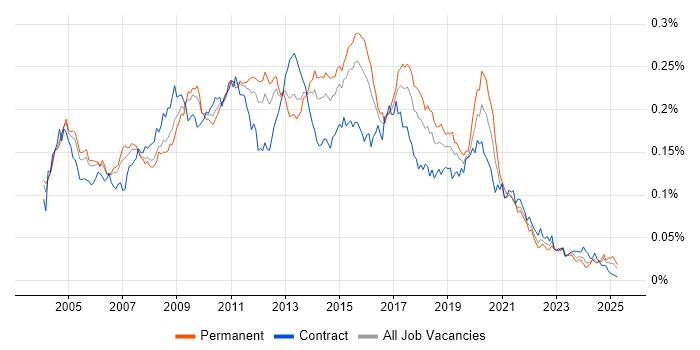Data Warehousing Developer (DWH Developer)
UK
The median Data Warehousing Developer (DWH Developer) salary in the UK is £75,000 per year, according to job vacancies posted during the 6 months leading to 2 May 2025.
The table below provides salary benchmarking and summary statistics, comparing them to the same period in the previous two years.
| 6 months to 2 May 2025 |
Same period 2024 | Same period 2023 | |
|---|---|---|---|
| Rank | 680 | 882 | 936 |
| Rank change year-on-year | +202 | +54 | +193 |
| Permanent jobs requiring a Data Warehouse Developer | 11 | 20 | 47 |
| As % of all permanent jobs advertised in the UK | 0.021% | 0.020% | 0.045% |
| As % of the Job Titles category | 0.023% | 0.021% | 0.049% |
| Number of salaries quoted | 3 | 19 | 39 |
| 10th Percentile | £46,500 | - | £42,500 |
| 25th Percentile | £54,375 | £37,000 | £46,875 |
| Median annual salary (50th Percentile) | £75,000 | £39,000 | £70,000 |
| Median % change year-on-year | +92.31% | -44.29% | +27.27% |
| 75th Percentile | £82,500 | £51,250 | £77,500 |
| 90th Percentile | - | £58,750 | £83,250 |
| UK excluding London median annual salary | £61,250 | £39,000 | £51,250 |
| % change year-on-year | +57.05% | -23.90% | -5.09% |
All Permanent IT Job Vacancies
UK
For comparison with the information above, the following table provides summary statistics for all permanent IT job vacancies. Most job vacancies include a discernible job title that can be normalized. As such, the figures in the second row provide an indication of the number of permanent jobs in our overall sample.
| Permanent vacancies in the UK with a recognized job title | 46,967 | 93,227 | 95,240 |
| % of permanent jobs with a recognized job title | 90.30% | 94.63% | 91.55% |
| Number of salaries quoted | 27,330 | 66,890 | 59,886 |
| 10th Percentile | £30,000 | £28,500 | £32,500 |
| 25th Percentile | £42,000 | £38,500 | £45,000 |
| Median annual salary (50th Percentile) | £57,500 | £52,900 | £60,000 |
| Median % change year-on-year | +8.70% | -11.83% | - |
| 75th Percentile | £75,000 | £71,250 | £81,250 |
| 90th Percentile | £97,500 | £90,000 | £100,000 |
| UK excluding London median annual salary | £52,000 | £50,000 | £52,500 |
| % change year-on-year | +4.00% | -4.76% | +5.00% |
Data Warehouse Developer
Job Vacancy Trend
Job postings that featured Data Warehouse Developer in the job title as a proportion of all IT jobs advertised.

Data Warehouse Developer
Salary Trend
3-month moving average salary quoted in jobs citing Data Warehouse Developer.
Data Warehouse Developer
Salary Histogram
Salary distribution for jobs citing Data Warehouse Developer over the 6 months to 2 May 2025.
Data Warehouse Developer
Top 7 Job Locations
The table below looks at the demand and provides a guide to the median salaries quoted in IT jobs citing Data Warehouse Developer within the UK over the 6 months to 2 May 2025. The 'Rank Change' column provides an indication of the change in demand within each location based on the same 6 month period last year.
| Location | Rank Change on Same Period Last Year |
Matching Permanent IT Job Ads |
Median Salary Past 6 Months |
Median Salary % Change on Same Period Last Year |
Live Jobs |
|---|---|---|---|---|---|
| England | +164 | 11 | £75,000 | +92.31% | 7 |
| Work from Home | +167 | 9 | £58,750 | +50.64% | 6 |
| London | +116 | 9 | £75,000 | +30.43% | 7 |
| UK excluding London | +195 | 2 | £61,250 | +57.05% | 1 |
| North of England | +82 | 1 | £42,500 | +8.97% | |
| Yorkshire | - | 1 | £42,500 | - | |
| South East | - | 1 | £80,000 | - |
Data Warehouse Developer Skill Set
Top 30 Co-occurring Skills and Capabilities
For the 6 months to 2 May 2025, Data Warehouse Developer job roles required the following skills and capabilities in order of popularity. The figures indicate the absolute number co-occurrences and as a proportion of all permanent job ads featuring Data Warehouse Developer in the job title.
|
|
Data Warehouse Developer Skill Set
Co-occurring Skills and Capabilities by Category
The follow tables expand on the table above by listing co-occurrences grouped by category. The same employment type, locality and period is covered with up to 20 co-occurrences shown in each of the following categories:
